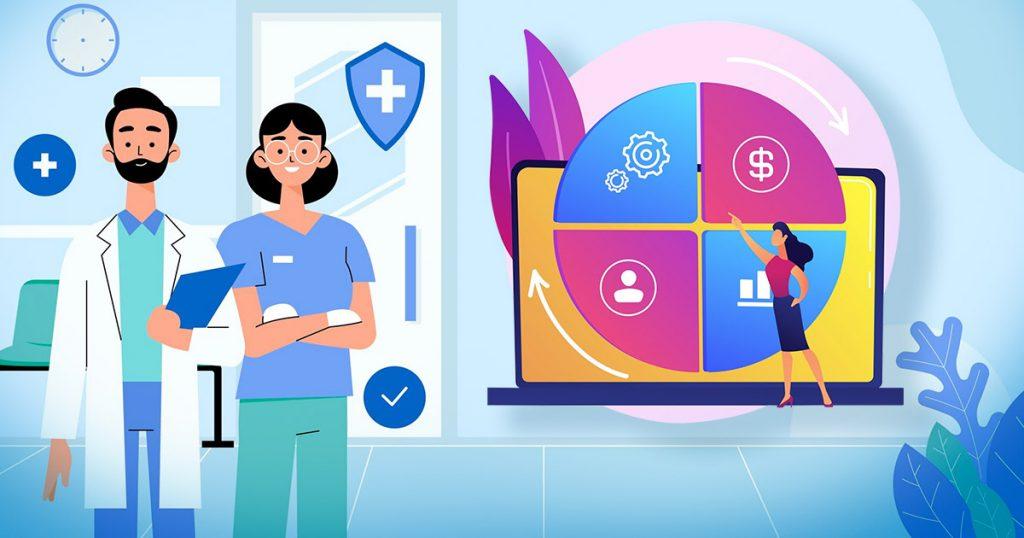Revenue Cycle Management (RCM) in healthcare manages the financial journey of a patient’s interaction with a healthcare provider. It covers everything from booking an appointment to finalizing payment for services. RCM is important for keeping hospitals, clinics, and medical practices financially healthy while ensuring patients have a smooth experience.
To understand it better, you need to know what RCM in healthcare is, why it matters, and how it works. Learn how it connects to medical billing and why managing the healthcare revenue cycle effectively is crucial.
What is RCM in Healthcare?
Revenue Cycle Management (RCM) in healthcare refers to the financial aspects of patient care. It ensures healthcare providers handle payments, insurance claims, and billing efficiently. The process begins when patients schedule an appointment and ends when all funds are received.
RCM is crucial in the healthcare industry to prevent problems like billing errors or claim processing delays, ensuring that providers receive payment for their services on time.
Why is RCM Important in Healthcare?
Healthcare providers rely heavily on RCM to ensure financial stability. Here’s why it matters:
- Ensures hospitals and clinics get paid quickly by insurers and patients.
- Minimizes mistakes that could delay payments.
- Automates processes to save time and resources.
- Keeps providers aligned with ever-changing healthcare rules.
- A clear and smooth billing process reduces stress for patients.
Without effective RCM, providers face risks like revenue loss, claim denials, and dissatisfied patients.
How Does RCM in Healthcare Work?
RCM involves several steps that manage the healthcare revenue cycle from start to finish.
Patient Scheduling and Registration
Collecting accurate patient details like insurance information, during registration prevents billing issues later.
Insurance Verification
Confirming insurance coverage before appointments ensures services will be paid for and informs patients about any out-of-pocket costs.
Charge Capture
Recording all services and procedures ensures that everything performed during the appointment is accurately billed.
Medical Coding
Converting healthcare services into standardized codes for billing is critical. Coding errors can lead to claim denials.
Claims Submission
Submitting complete and accurate claims to insurance companies speeds up the reimbursement process.
Denial Management
Addressing and resubmitting denied claims quickly helps avoid revenue loss.
Payment Posting
Recording payments from insurers or patients allows precise financial tracking.
Patient Billing and Collections
Sending bills to patients for outstanding accounts and maintaining clear communication about payments enhances collections.
The Importance of RCM in Medical Billing
Knowing revenue cycle management (RCM) is critical for healthcare providers because it has a direct impact on their financial performance. RCM ensures claims are handled accurately and efficiently, playing a key role in medical billing. Here’s why effective RCM is important:
Better Cash Flow
Efficient RCM speeds up payments from insurers and patients, improving the practice’s cash flow.
Higher Revenue
By reducing claim denials and ensuring accurate billing, RCM helps healthcare providers maximize their income.
Improved Patient Experience
Clear and smooth billing systems eliminate errors and help patients understand their financial responsibilities.
Regulatory Compliance
RCM keeps practices aligned with changing healthcare regulations, helping avoid legal or financial issues.
Effective RCM allows healthcare providers to focus on providing quality treatment while remaining financially stable.
Benefits of RCM for Healthcare Providers
RCM offers many advantages, including:
- Early error detection reduces rejections.
- Efficient processes result in quicker reimbursements.
- Automation minimizes manual labor, saving time and money.
- Detailed reporting helps providers make informed decisions.
- Simplified billing improves the patient experience.
Challenges in Managing the Healthcare Revenue Cycle
RCM is not without its difficulties. Common challenges include:
- Navigating different insurers’ rules can be time-consuming.
- Providers must adapt to frequent changes in healthcare laws.
- Even minor errors can result in claim rejection.
- Teams need proper training to use RCM systems efficiently.
Overcoming these challenges requires reliable RCM tools, clear workflows, and well-trained staff.
The Future of RCM in Healthcare
The healthcare revenue cycle is evolving with new technology and changing patient needs. Here are key trends shaping its future:
- Artificial intelligence in RCM can identify errors, predict claim outcomes, and streamline processes for better efficiency.
- Providers are prioritizing transparent billing by communicating costs clearly and upfront to patients.
- Incorporating RCM systems with EHRs improves data accuracy and facilitates information sharing.
- RCM systems are evolving to support value-based care models, which focus on patient outcomes over service volume.
Choosing the Right RCM System
When selecting an RCM system, healthcare providers should look for:
- Simple interfaces make it easier for staff to learn and use the system quickly.
- The system should work smoothly with existing billing or EHR applications.
- It should be scalable to accommodate the growth of the practice.
- Vendors should provide continuing customer support and regular upgrades to ensure that the system runs smoothly.
How RCM Keeps Healthcare Practices Running Smoothly
The true value of Revenue Cycle Management (RCM) is in its ability to keep healthcare finances stable while improving the patient experience. By streamlining everything from patient registration to final payments, RCM helps reduce errors, speed up payments, and ensure financial stability. With the use of new technologies like AI and EHR systems, RCM is becoming more efficient, allowing healthcare providers to better manage both care and finances. This balance ensures that healthcare systems can continue to deliver quality care while staying financially healthy.
